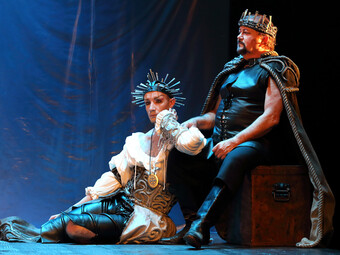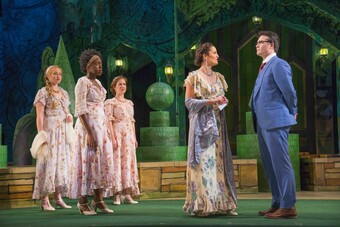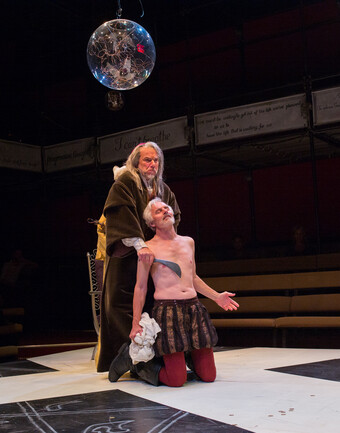Some Fringe Conventions for Performing Shakespeare, and Romeo and Juliet
Actor's Shakespeare Project believes that Shakespeare's words "are urgently relevant to our times." "Our imperative," writes Artistic Director Allyn Burrows, "is to bring you the clearest, strongest, and deepest storytelling attainable through the words of the greatest playwright in history." The presentation of what is urgently relevant to our times, through Shakespeare's great plays, is not a new project but one worthy of interest and scrupulous coverage. Actor's Shakespeare Project (hereafter ASP) champions this mission in New England, and has claimed its banner, along with continual NEA funding, as most prominent of the fringe companies in greater Boston. At present it is also perhaps the sole company focusing on classic dramatic literature in the area, though I would be happy to be corrected on this score if I need to be. Significantly, ASP carries the torch for a genre of Shakespeare performance that is particular to its time. Its qualities were splendidly displayed in its most recent achievement, Romeo and Juliet at the Dorchester Strand.
Mr. Burrows has codirected ASP's Romeo and Juliet with Bobbie Steinbach, another of the company's forces (whom I particularly recall mesmerizing as Volumina in a Coriolanus at the Somerville Armory in 2009). In lieu of director's notes, the pair conversed about the process of working together. Burrows (A) mostly takes the role of interviewer, quizzing Steinbach (B) on the decisions they have made as a collaborative unit. A, below, is Burrows, B is Steinbach:
A: ASP has chosen a Boston landmark, The Strand in Dorchester, as its venue for this production. What do you consider to be the challenges and opportunities in that choice?
B: At first I thought the Strand was too huge, too grand for the intimate, bare stage production I envisioned. Once we knew we could place some of the audience onstage, it became a much more viable and exciting space. Janie had designed for the space previously and she and Deb Sullivan, our Production Manager, were completely instrumental in the process of making it a more intimate venue.

in the ASP production of Romeo & Juliet. Photo by Stratton McCrady.
Intimacy is a virtue in the lexicon of ASP, and the transformation of the grand old Strand into a suitably bare and intimate performance space surely presents a challenge, like reconstructing a black box of the 1960s at Bayreuth. The audience, indeed, was divided into sections, one of which was seated onstage, upstage of the action in a set of risers. I was seated in the traditional house section, and watched the play suspended in the leftover proscenium.
The company, however, is not influenced by necessity, but internally motivated by its own collaborative vision of Shakespeare's plays, and doubtless this drives the decision.
The prologue—one of the play's textual problems, which is not extant in the first folio—was presented in a cinematic mode, sections intercut with another kind of storytelling: stage violence, noise and action from the full company in the opening spar—replete with bitten thumbs and frozen expressions when the friar (Antonio Ocampo-Guzman) speaks again. To be sure, Actor’s Shakespeare Project successfully blocks an audience's initial boredom or disconnection. Instead of the stern composure of verse laid bare, the text was immediately thrown into a chaos of images and sound. The ASP vision of Verona demonstrated an immediate liveliness, and choreographed fighting dripped from the stage and into the aisles. When the fight was dissolved at the Prince's entrance (Ben Rosenblatt), the full company was onstage, including actors who would later be introduced as principals, dressed in the costume of an unnamed but scrappy assembly of disposable thugs, and studded (by costume- and puppet-designer Kathleen Doyle) with punches of vibrant red and black.
ASP has always had a great commitment to the convention of doubling, though actors seeking opportunities with the company could probably span the length of several Dorchester blocks. The company, however, is not influenced by necessity, but internally motivated by its own collaborative vision of Shakespeare's plays, and doubtless this drives the decision. If we know nothing else at the outset of this play, we know that this set of actors is determined to be wild and versatile: even Paula Langton, who shortly goes on to complain of her aching bones (and so on) as the Nurse, might be recognized holding her own in the brawl (designed by Violence Designer Trevor Olds, and set to a pumping electronic music by Arshan Gailus). The present ensemble and its multiform gifts are utilized at every turn, as an important convention for Shakespeare’s plays in Boston's most prominent fringe.
Romeo and Juliet provides myriad opportunities for the actors to show their stuff. The lovers in question (Jason Bowen, Julie Ann Earls) are amorous all right, and each has moments of beauty and charm. Earls' innocence as Juliet is palpable and true; she has a girl's energy when she leaps at the thought of Romeo, and shows a surprising, restrained depth when learning of Tybalt's death. Though Romeo is often denied the same innocence, he has scores of it in Bowen, where even his rash, violent behavior is that kind of innocence most easily misguided: naivete. Langton's Nurse has a developed comedic style with outrageous shades of Jerri Blank that other fumbling nurses ought to learn from and reprise as an approach: her version of the role is smart and can be genuinely, roaringly funny, as Nurses without the benefit of appearing in drag often are not. Maurice Emmanuel Parent is horrifying as Mercutio, whose bulging eyes and personality make his speech on the Queen Mab (and his other bits) the stuff of a psychotic PTSD fantasy, laced with sex. Ben Rosenblatt is a greasy type as Paris, and a really hilarious idiot, in totally incomprehensible shorts, as the nurse's companion, Peter.
Ken Baltin is a brilliant Lord Capulet (thankfully allowed to play his arc in its fullness by the text employed) who mixes true paternal love with a gangster's ominous pragmatism in his portrayal: the performance is a true insight to the world of the play, both highly charming and very disturbing, with reminders of Pacino in The Godfather throughout. This means there is a great deal of information in his banquet speech and brief negotiations; bits that are politically delicious but easily blown if the actor is the least bit careless. Capulet's wife (Miranda Craigwell) is as statuesque and opaque as a runway model beside him: the couple does not quite make sense together, and this is an advantage. They occasionally teem with some silent intrigue by virtue of the mismatch alone. The quality of Juliet's adolescent isolation is very apparent in the interactions of the Capulets, and ASP's version is tremendously unsettling because it efficiently establishes a context. Marriages, in Juliet's Verona, do not seem made for love. To show what this looks like in day-to-day life, however, is another kind of subtlety.
Last, not least, Antonio Ocampo-Guzman uses a Spanish accent (his own) to very good effect as the Friar, letting it define an older world ruled by different spiritual values than the Verona of secular brawls. He is a convincing solace for Romeo and Juliet and succeeds in everything except the portrayal of a person who has absolutely committed his life to philosophy. Of this last, however, it is certainly difficult to find any model in contemporary culture, and we might not understand him if he evinced such a quality to the hilt. As so often happens, the failure is of the actor's context, and not his own.








Comments
The article is just the start of the conversation—we want to know what you think about this subject, too! HowlRound is a space for knowledge-sharing, and we welcome spirited, thoughtful, and on-topic dialogue. Find our full comments policy here